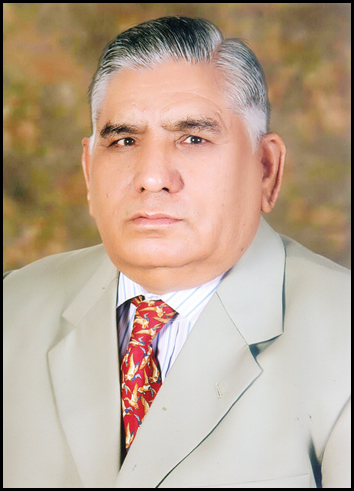

Shaukat Ali Jawaid
Most of the political parties in Pakistan don’t have any Think Tanks and the system of a shadow cabinet also does not exist in real sense. They lack a core group of professionals, hence when they come into the Government, they end up making blunders and have to pay a heavy price for that. They do not have any system of professional training of their leadership. If it was not enough, most of our politicians have not developed a habit of reading either so that they could learn from the experience of others the world over.
A vast majority of these politicians also lack loyalty to their parties. They wish to achieve everything overnight using all the shortcuts they can, hence earning the name of political weathercocks moving from one party to the other quite frequently.
In fact, the Term Lota has become very popular for the politicians. For success one has to be honest, sincere, need devotion and dedication which are essential components for the success of any professional, may it be politics, economics, business or health services. Hard work, learning from experience has no substitute. The story of success of Theodore Roosevelt who became the youngest President of United States of America in 1901, I am sharing here, is meant to offer an unsolicited advice to all professionals, medical profession being no exception, showing that practicing professionalism earns rich dividends and ensures success. It also shows how Theodore Roosevelt as a young politician not only faced the personal as well as political crisis but was also able to control crime in the State of New York as Police Commissioner benefitting from the guidance and advice of two professional reporters. He was also able to control corruption in Civil Service Commission of United States as Chairman showing his leadership qualities.
“Theodore Roosevelt first got the news of birth of his first child- a healthy baby girl while he was at Albany legislature but few hours later the second telegram, he got shattered all the joys and plunged Roosevelt into an excessive nightmare of grief as a grand tragedy was waiting for him. On arrival at New York, he was told that his mother is dying and his wife Alice was dying too. By midnight both women were in semiconscious state. His forty-nine years old mother died of Typhoid Fefer at 3.00 AM. His wife Alice died soon after from Acute Kidney Disease. He lost both of them the same day. At tis Roosevelt remarked “The light has gone out of my life”.
Two days after the funeral, Roosevelt looked a changed man. He told one of his friends in the legislature that “I think I should go mad if I were not employed.” He went into depression which became severe with every passing day. At the National Republican Convention in June, he led a small but vocal independent group supporting reformer Vermont Senator George Edmunds against James Blain the choice of Republican party bosses. He failed in his mission as delegates went with the party Boss’s choice at which he remarked that “Blaine was by far the most objectionable because of his personal honesty as well as his faithfulness as a public servant are open to questions. His victory speaks badly for the intelligence of the party”. First, he decided to support any honest Decorate but later when he announced that he will stand by the party decision, stunned his independent group The catastrophe of his private life and the political crisis in which he found himself had its effect. He had annoyed his republican Bosses as well as hie friends in the independent group.
By the end of Summer of 1886, he was ready to re-enter the political world. He entered and lost the race for Mayor of New York.
After campaigning for the victory of Benjamin Harrison in the 1888 Presidential race, he was expecting to be appointed as Assistant Secretary of State but he was offered a minor federal post as one of the three members of the Civil Service Commission. His friends advised him to decline the offer but he surprisingly accepted that post and remained there for six years. In 1896 he was offered the job of Assistant Secretary of Navy and again his friends thought he deserved better and he should refuse it but again he accepted that offer much to the surprise of his friends. He sacked the corrupt in the Civil Service Commission which sent a message of a change. He established contact and talked to all the low-level staff. He virtually ran as One-Man Commission, which angered the Republican bosses but he was not afraid of newspapers nor he was afraid of losing his job. He was successful to introduce reforms and merit was upheld and no open violations of the laws was tolerated. He had in fact established his leadership.
When William Strong a Republican was elected as Mayar of New Yhork he offered Roosevelt the job of Police Commissioner. The Police Board had two Republicans and Two Democrats but Roosevelt accepted the offer conditionally that he will chair the Board. Democrat members objected to his style of working dominating the board saying he talks, talks and talks and every day he is in the newspapers. To learn the machination of police department he asked for guidance from two veteran police reporters Jacob Riis and Lincoln Steffens. He benefitted greatly from the talented reporter Riis who had been covering the police department corruption for Evening Post who was now heading Evening Post Police Bureau. With solid advice from the two reporters, the Police Commissioner was ready for his next venture. Corruption in Police was rampant from Top to Bottom; the entire police force was demoralized.
New police recruits had to pay fee for their appointment with an understanding that with the rise in their ranks, they will contribute to the blackmail fund. For a monthly fee gambling houses and brothels were guaranteed protection from raids, grocery stores could display their goods on sidewalks and compliant saloons could remain open even on Sundays against the law. With each higher rank a policeman or a politician attained, his percentage of blackmail fund grew. He had to purge the leaders at the top. Within three weeks he forced the resignation of powerful Superintendent of Police and his chief inspector as they could not account for how they had hundreds of thousands of dollars in their bank accounts and all these generated headlines in every newspaper. It became known that Police Commissioner will not spare anyone involved in corruption.
In future merit would grant every recruitment and promotion. This provoked anxiety among Republicans. Disguising his identify with an oversize overcoat and a Floppy Hat he made a series of unannounced midnight rambles. He roamed the streets on midnights, Roosevelt found policeman relaxing in bars eating at all nigh restaurants, entertaining women on street corners. In each case he summoned the officer to appear at headquarters the following morning for disciplinary action. Once he found a patrolman eating Oyster at a Third Avenue Bar. Without disclosing his identify he asked the Police official “why he was not at the street at his post.” Why it matters to you and why you are asking, who are you the police official remarked. At this Theodore Roosevelt said “I am police commissioner Roosevelt.” The patrolman mocked “You are Grover Cleveland and Mayor Strong all in a bunch.”
Stories of his unpresented midnight rambles captivated everyone alike. Seasoned reporters and writers often accompanied him. He came into prominence and one of the newspapers wrote “The most interesting man in America”. While few individuals were shirking their duties, Majority of the policemen, he thought, were good people but caught in a bad system that has to be changed. Those who were found doing their duty were congratulated. He was of the view that it was important to recognize good behavior as to punish bad conduct.
He introduced a system, of award certificates and medals for officers who exhibited courage and daring., men who risked their lives to catch the criminals. Recognition ceremonies, promotions based entirely on merit, professional training, formation of a popular bicycle squad were some of the innovations he had introduced.
He was not afraid of facing the critics. He astonished his critics when he accepted an invitation to attend the massive parade protesting the new enforcement policy of the Police Czar. One of the largest banners displayed in the parade had “Razzle Dazzle Reform Racket.” He asked the man carrying this banner, “can I keep it as a Souvenir.” One of the newspapers summed up the event next day with a headline “Cheered by those who came to Jeer? During his tenure as Governor Roosevelt liked to refer to an old African proverb “Speak softly and carry a big Stick”
His name was added for Vice President to the Republican Ticket with McKinley as President as Republicans thought he will have more attraction. He had no desire to be a figurehead. No Vice President had been ever elected to the Presidency during the last sixty years. However, he accepted the offer stating that if he refused, people will say “Roosevelt has a big head and thinks he is too much of a man to be Vice President.” When the convention nominated him, he thought he had no choice but to accept that. But the President gave him no responsibilities nor he was ever consulted on important matters. He started thinking to return to the law school but his friends advised him to be patient and wait as they were sure that Whie House will be his future home. On September 6th 1901 an assassin’s bullet brought Mckinley’s life to an end at forty-two years of age, Theodore Roosevelt was shot into the Presidency and became the youngest man to occupy the white house in the history of Unted States.” His success has many lessons for those who dare to learn.
We in Pakistan can also overcome most of our problems provided we decide to uphold merit in all appointments, selections and promotions, introduce a system of reward and punishment with a strong monitoring and accountability system put in place. Every country in the world has gone through crisis but eventually came out of it successfully. There is no reason why we cannot succeed provided we are prepared to learn from our mistakes.
REFERENCE
- Leadership in Turbulent Times. Eds. Doris Kearns Goodwin. Penguin Books 2018 USA.



